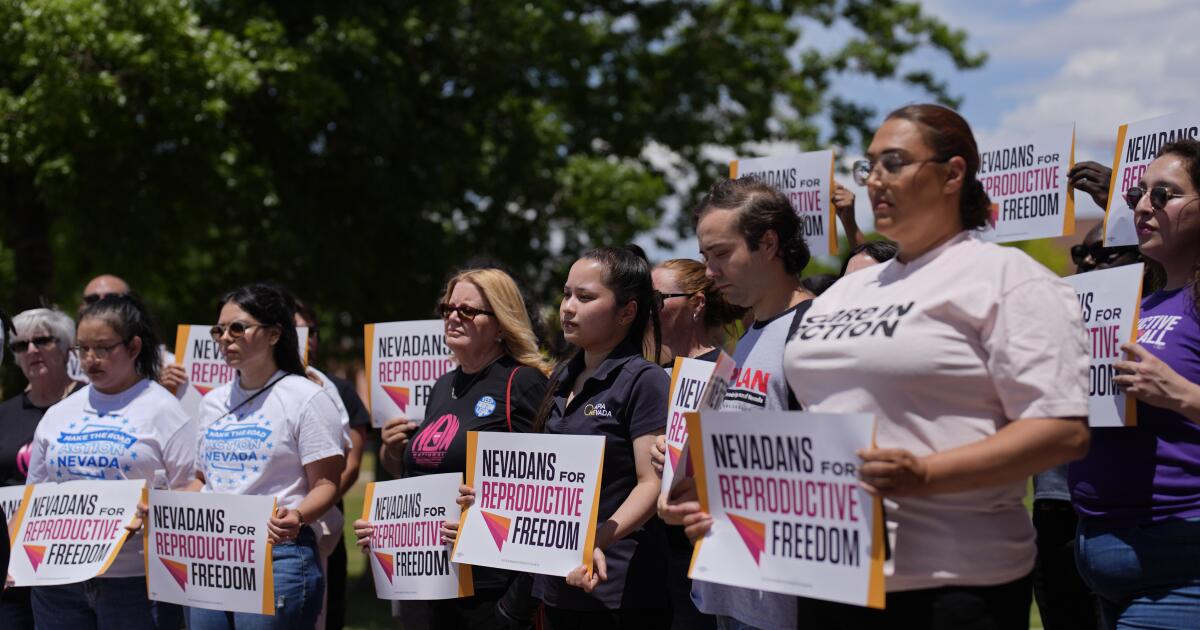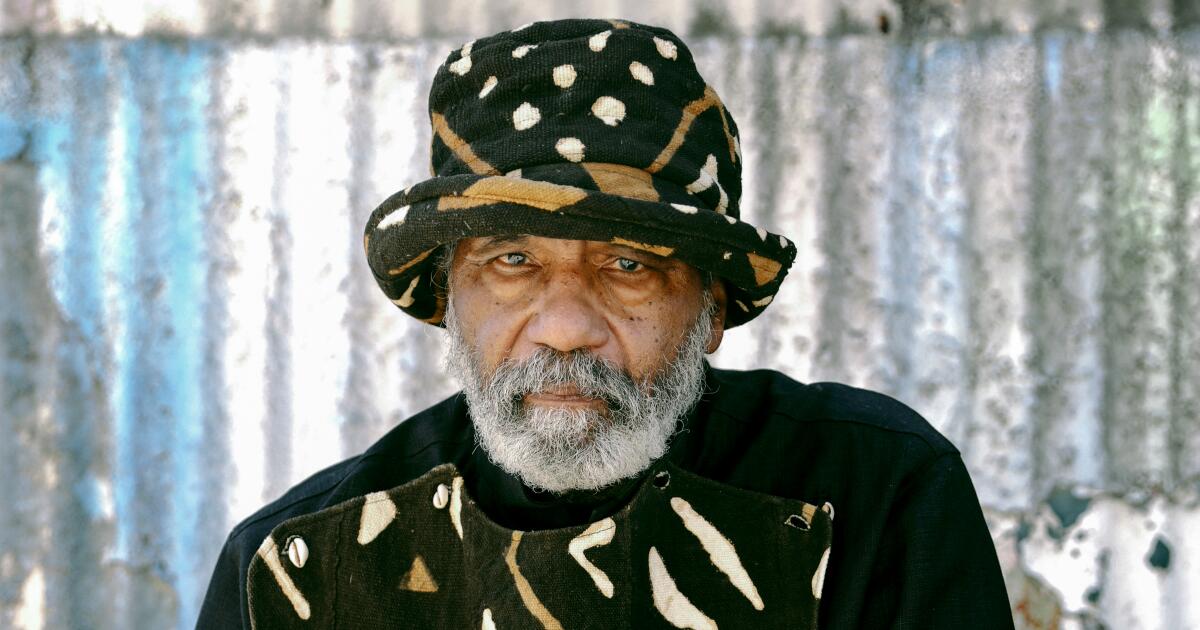Politics
Years after California put abortion on the ballot, Nevada and others try the same. It won't be so easy.

Nevada organizers last month celebrated a flood of voter signatures in support of placing a measure ensuring abortion rights on the November ballot.
But their work isn’t over — not even close.
Nevada is among about a dozen states where abortion activists are working to put the protection of reproductive rights into voters’ hands, as California did two years ago. But unlike in liberal California, organizers in some of those states must navigate a patchwork of onerous bureaucratic hurdles and overcome hostile political opposition.
Ballot measures in neighboring Nevada seeking to amend the state constitution must be approved by voters in two consecutive general elections.
“We will have to go through the process all over again,” Tova Yampolsky, the campaign manager for Nevadans for Reproductive Freedom, said from a coffee shop in May just minutes from the casinos along the Strip as signatures were being officially tallied by election officials across the state.
For organizers like Yampolsky, that means at least two more years of uncertainty in an already uncertain political landscape after the U.S. Supreme Court overturned the right to abortion nationwide in 2022. While former President Trump, the presumptive 2024 GOP nominee, has so far stopped short of calling for a national abortion ban, he has supported limiting access and has taken credit for appointing the conservative justices who overturned Roe vs. Wade.
Yampolksy’s team will have to fight for attention in the perpetual swing state, but in some ways, getting voter approval is the easy part. Recent polling shows strong abortion support among Nevadans.
It’s the path to the ballot that’s proving difficult. The campaign has already fended off Republican backed legal challenges over the ballot measure language. Now, they wait to see if they gathered enough eligible signatures equal to 10% of the total votes cast in the most recent general election — more than California’s 8% threshold. While California has no geographical requirement for signatures, in Nevada, support must be gathered equally from each of the state’s four congressional districts.
“We’re going to have to fight for every vote,” Yampolsky said. “We’re not taking anything for granted.”
Within weeks of the Supreme Court decision overturning federal abortion protections, the California Legislature was among the first in the nation to approve a statewide ballot measure to guarantee the “fundamental right to choose to have an abortion.” Top Democrats including Gov. Gavin Newsom helped pump millions of dollars into the campaign, and nearly 67% of voters approved the measure in the November 2022 election.
Voters in a handful of states, including Ohio, Michigan and Vermont, approved similar protections. More initiative efforts are now underway in states such as Arizona, Montana, Colorado, Arkansas and Florida.
“We’re seeing the important role that direct democracy plays in making sure the will of the people is heard,” said Chris Melody Fields Figueredo, executive director of the Ballot Initiative Strategy Center, which supports progressive causes. “Ballot measures are a key part of a thriving democracy. It’s giving people the agency to vote on issues that are incredibly popular and often transcend party lines.”
Some states have a more difficult path to abortion rights by way of direct democracy than others — and legislative attempts to make the ballot initiative process even harder have proliferated in recent years.
“Every legislative session we’re seeing new efforts to undermine the will of the people,” Fields Figueredo said.
California ballot measures require a simple majority of votes to win. In Florida, where abortion is banned after six weeks of pregnancy, initiatives require a 60% supermajority of votes to pass, and state Republicans recently tried to increase that threshold even higher to a two-thirds vote, or about 66%.
Abortion is banned in Arizona after 15 weeks of pregnancy, and reproductive health advocates remain leery about future access after a state court recently attempted a near total ban. Organizers say they have already acquired more than enough signatures to qualify for a ballot measure to secure abortion access in November.
To get on the ballot in Arizona, initiatives must get signatures that equal at least 15% of the electorate, and the Legislature has proposed adding a new requirement for that threshold to be met in each congressional district, not just statewide. Arizona Republicans also attempted to pass a law that would have allowed the Legislature to rein in some decisions made by ballot initiatives, but ironically, that proposal had to go to voters — and was rejected in 2022.
Republican lawmakers in Arkansas and Missouri, where ballot measures for abortion rights are underway, have also tried to make it harder for residents to legislate at the polls.
The timing is no coincidence, said Mini Timmaraju, president and chief executive of Reproductive Freedom For All, formerly NARAL Pro-Choice America.
“They don’t have the majority and haven’t had the majority in a long time on this issue,” Timmaraju said of anti-abortion lawmakers nationwide. “They’ve orchestrated a whole mechanism to subvert and go around the majority will in this country.”
Anti-abortion activists have been working to thwart the initiatives, with some backing competing ballot measures — a move that abortion-rights groups say is meant to deter and confuse voters.
Nevada Right to Life Director Melissa Clement opposes the proposal in her state and accused Democrats of “taking one of the most difficult and traumatic decisions a woman can make and using it for political fodder.”
While organizers see newly proposed rules as strategic hurdles that make citizen led initiatives harder to succeed, Republicans who support them say that changing state constitutions is a serious matter that requires more safeguards.
Some states do not allow citizen led initiatives at all, including Texas and West Virginia, where most abortions are banned.
As in California, abortion is legal in Nevada up to 24 weeks, and providers have reported that they have seen an influx in patients from other states. Nevada voters in 1990 passed a referendum protecting abortion rights after the Supreme Court ruled in favor of more abortion restrictions then.
Lindsey Harmon, executive director of Planned Parenthood Votes Nevada, said even before the Dobbs decision, Nevadans prioritized “individual freedoms.” While abortion is legal in her state, she fears that the future is dependent on who is in office.
“There’s still threats out there,” Harmon said. “Even when you pass a measure successfully, you then have to go back and enforce that. You have to make the Legislature pull back old laws that are no longer constitutionally viable. You have to ask the regulatory bodies to go in there and change the regulations to match what is now in the state constitution. So this is a never-ending battle.”
The Associated Press contributed to this report.

Politics
Trump sends official notification to Congress on strikes against Iran

NEWYou can now listen to Fox News articles!
President Donald Trump on Monday sent an official notification to Congress about the U.S. strikes against Iran, in which he attempted to justify the military action in the now expanding conflict in the Middle East.
In a letter obtained by FOX News, Trump told Senate President Pro Tempore Chuck Grassley, R-Iowa, that “no U.S. ground forces were used in these strikes” and that the mission “was planned and executed in a manner designed to minimize civilian casualties, deter future attacks, and neutralize Iran’s malign activities.”
This comes after joint U.S.-Israeli strikes against Iran on Saturday as part of Operation Epic Fury, triggering a response from Tehran and a wider conflict in the region. The strikes killed the Islamic Republic’s Supreme Leader Ali Khamenei and other military leaders.
President Donald Trump on Monday sent an official notification to Congress about the U.S. strikes against Iran. (AP Photo/Alex Brandon)
Trump wrote that it is not yet possible to know the full scope of military operations against Iran and that U.S. forces are prepared to take potential further action.
“Although the United States desires a quick and enduring peace, not possible at this time to know the full scope and duration of military operations that may be necessary,” Trump wrote. “As such, United States forces remain postured to take further action, as necessary and appropriate, to address further threats and attacks upon the United States or its allies and partners, and ensure the Government of the Islamic Republic of Iran ceases being a threat to the United States, its allies, and the international community.”
“I directed this military action consistent with my responsibility to protect Americans and United States interests both at home and abroad and in furtherance of United States national security and foreign policy interests,” he added. “I acted pursuant to my constitutional authority as Commander in Chief and Chief Executive to conduct United States foreign relations.”
A general view of Tehran with smoke visible in the distance after explosions were reported in the city, on March 2, 2026, in Tehran, Iran. (Contributor/Getty Images)
Trump said he was “providing this report as part of my efforts to keep the Congress fully informed, consistent with the War Powers Resolution,” as some Republican and Democrat lawmakers attempt to restrain the president’s military action, which they affirm is unconstitutional without congressional approval.
The president also accused Iran of being among the largest state sponsors of terrorism in the world and purported that the “Iranian regime continues to seek the means to possess and employ nuclear weapons,” even after the White House said in June that precision strikes at the time “obliterated” Iran’s nuclear enrichment facilities.
US SURGES FORCES TO MIDDLE EAST AS PENTAGON WARNS IRAN FIGHT ‘WILL TAKE SOME TIME’
A person holds an image of Iran’s Supreme Leader Ayatollah Ali Khamenei as Iranian demonstrators protest against the U.S.-Israeli strikes, in Tehran, Iran, Feb. 28, 2026. (Majid Asgaripour/WANA (West Asia News Agency) via Reuters)
CLICK HERE TO DOWNLOAD THE FOX NEWS APP
“As I previously communicated to the Congress, Iran remains one of the largest, if not the largest, state-sponsors of terrorism in the world,” Trump said in the letter on Monday. “Despite the success of Operation MIDNIGHT HAMMER, the Iranian regime continues to seek the means to possess and employ nuclear weapons. Its array of ballistic, cruise, anti-ship, and other missiles pose a direct threat to and are attacking United States forces, commercial vessels, and civilians, as well as those of our allies and partners.”
“Despite my Administration’s repeated efforts to achieve a diplomatic solution to Iran’s malign behavior, the threat to the United States and its allies and partners became untenable,” he continued.
Fox News’ Tyler Olson contributed to this report.
Politics
Rep. Kevin Kiley opts against challenging fellow Republican Tom McClintock

Northern California Rep. Kevin Kiley (R-Rocklin), whose congressional district was carved up in the redistricting ballot measures approved by voters last year, announced Monday that he would not challenge fellow Republican Rep. Tom McClintock of Elk Grove. Instead, he plans to run in the Democratic-leaning district where he resides.
“It’s true that I was fully prepared to run in [McClintock’s district], having tested the waters and with polls showing a favorable outlook in a ‘safe’ district. But doing what’s easy and what’s right are often not the same,” Kiley posted on the social media site X. “And at the end of the day, as much as I love the communities in [that] District that I represent now – and as excited as I was about the new ones – seeking office in a district that doesn’t include my hometown didn’t feel right.”
Kiley, 41, currently represents a congressional district that spans Lake Tahoe to Sacramento. He did not respond to requests for comment.
But after California voters in November passed Proposition 50 — a ballot measure to redraw the state’s congressional districts in an effort to counter Trump’s moves to increase the numbers of Republicans in Congress — Kiley’s district was sliced up into other districts.
As the filing deadline approaches, Kiley pondered his path forward in a decision that was compared by political insiders to the reality television show “The Bachelor.” Who would receive the final rose? McClintock’s new sprawling congressional district includes swaths of gold country, the Central Valley and Death Valley. The district Kiley opted to run in includes the city of Sacramento and the suburbs of Roseville and Rocklin in Placer County.
Kiley was facing headwinds because of the Republican institutional support that lined up behind McClintock, 69, who has been in Congress since 2009 and served in the state Legislature for 26 years previously. President Trump, the California Republican Party and the Club for Growth’s political action committee are among the people and groups who have endorsed McClintock.
Conservative strategist Jon Fleischman, a former executive director of the state GOP, said he was thrilled by Kiley’s decision, which avoids a divisive intraparty battle.
“If you open up the dictionary and look for the word conservative, it’s a photo of Tom McClintock. He is the ideological leader of conservatives, not only in California but in Congress for many, many years,” Fleischman said, adding that the endorsements for McClintock purposefully came because Kiley was considering challenging him.
Kiley, who grew up near Sacramento, attended Harvard University and Yale Law School. A former Teach for America member, he served in the state Assembly for six years before being elected to Congress in 2022 with Trump’s backing. But he has bucked the president, notably on tariffs. He also unsuccessfully ran to replace Gov. Gavin Newsom during the 2021 recall, and has been a constant critic of the governor.
Kiley is now running in a Sacramento-area district represented by Rep. Ami Bera (D-Elk Grove). Democrats in the newly drawn district had a nearly 9-point voter registration edge in 2024. Bera is now running in the new version of Kiley’s district.
In Kiley’s new race, his top rival is Dr. Richard Pan of Sacramento, a former state senator and staunch supporter of vaccinations.
“Kevin Kiley can try to rebrand himself, but voters know his extreme record,” Pan said in a statement. “He has stood with Donald Trump 98% of the time and was named a ‘MAGA Champion.’ The people of this district deserve better than political opportunism disguised as moderation. This race is about who will actually fight for healthcare, public health, and working families. I’ve done that my entire career. Kevin Kiley has not.”
Politics
Video: Defense Officials Give No Timeline for War in Iran as U.S. Boosts Forces

new video loaded: Defense Officials Give No Timeline for War in Iran as U.S. Boosts Forces
transcript
transcript
Defense Officials Give No Timeline for War in Iran as U.S. Boosts Forces
At a Pentagon news conference, top defense officials said that the U.S. military was sending more forces to the Middle East and expects to “take additional losses.” Earlier, President Trump said that the U.S. could continue striking Iran for the next four to five weeks.
-
“We didn’t start this war, but under President Trump, we are finishing it. This operation is a clear, devastating, decisive mission. Destroy the missile threat. Destroy the navy. No nukes. President Trump has all the latitude in the world to talk about how long it may or may not take. Four weeks. Two weeks, six weeks. It could move up. It could move back. We’re going to execute at his command the objectives we’ve set out to achieve.” “We expect to take additional losses. And as always, we will work to minimize U.S. losses. But as the secretary said, this is major combat operations.” Reporter: “Are there currently any American boots on the ground in Iran?” “No, but we’re not going to go into the exercise of what we will or will not do. I think — it’s one of those fallacies for a long time that this department or presidents or others should tell the American people. This — and our enemies by the way — here’s exactly what we’ll do. Why in the world would we tell you, you, the enemy, anybody, what we will or will not do in pursuit of an objective?”
By Christina Kelso
March 2, 2026
-

 World5 days ago
World5 days agoExclusive: DeepSeek withholds latest AI model from US chipmakers including Nvidia, sources say
-

 Massachusetts5 days ago
Massachusetts5 days agoMother and daughter injured in Taunton house explosion
-

 Denver, CO5 days ago
Denver, CO5 days ago10 acres charred, 5 injured in Thornton grass fire, evacuation orders lifted
-

 Louisiana1 week ago
Louisiana1 week agoWildfire near Gum Swamp Road in Livingston Parish now under control; more than 200 acres burned
-

 Technology1 week ago
Technology1 week agoYouTube TV billing scam emails are hitting inboxes
-

 Politics1 week ago
Politics1 week agoOpenAI didn’t contact police despite employees flagging mass shooter’s concerning chatbot interactions: REPORT
-

 Technology1 week ago
Technology1 week agoStellantis is in a crisis of its own making
-

 News1 week ago
News1 week agoWorld reacts as US top court limits Trump’s tariff powers
















